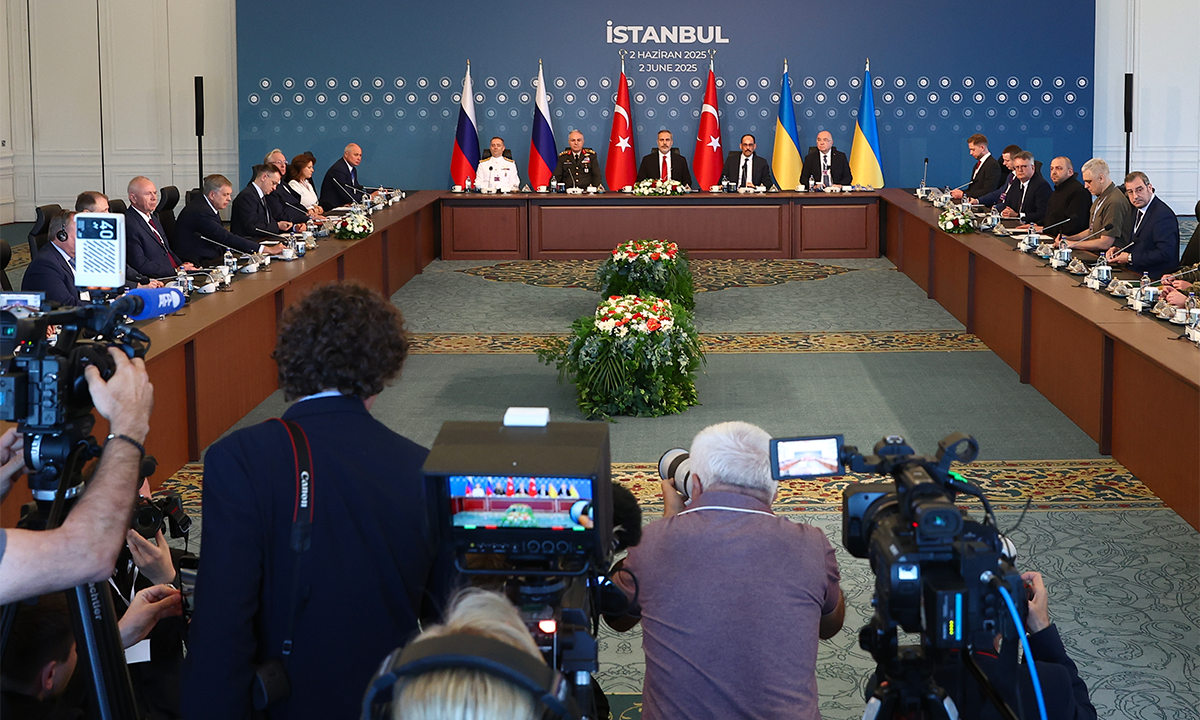
Members of delegations attend a second round of direct talks between Russia and Ukraine at the Ciragan Palace in Istanbul, Turkey on June 2, 2025. Photo: VCG
The latest round of direct talks between Russia and Ukraine in Istanbul has ended on Monday, reported Al Jazeera citing a Turkish foreign ministry spokesman. "The meeting is over. It didn't end negatively," ministry spokesman Oncu Keceli said of the talks at Istanbul's Ciragan Palace, which lasted just over an hour, per the report.
The talks came a day after Ukraine claimed it launched a large-scale drone attack deep inside Russia, which was described by a Russian blogger as "Russia's Pearl Harbor," while Moscow pounded Ukraine with missiles and drones, according to media reports.
The second round of peace talks between Russia and Ukraine ended barely an hour after they began in Istanbul on Monday. The talks - the second such direct contacts between the sides since 2022 - had already begun nearly two hours later than scheduled with no explanation of the delay, reported Reuters.
The Ukrainian delegation was led by Defense Minister Rustem Umerov, officials said. Vladimir Medinsky, an aide to Russian leader Vladimir Putin, headed the Kremlin team, Russian state media reported, per AP.
Ukraine's Security Service (SBU) said that Ukraine's special operation codenamed "Spiderweb," which was planned and executed over 18 months, damaged or destroyed at least 41 Russian bombers, according to Kyiv Post.
The SBU said the strikes, resulted in an estimated $7 billion in damage, per Kyiv Post, which also said the figure has not yet been independently verified.
The SBU were able to attack strategic bomber aircraft at Russian air bases on Sunday by hiding explosive-laden drones inside the roofs of wooden sheds, Reuters reported, citing a Ukrainian security official and images posted online.
"It's genuinely satisfying when something I authorized a year and six months ago comes to fruition and deprives Russians of over forty units of strategic aviation," Ukrainian President Volodymyr Zelensky said on X on Monday.
Russia's Defense Ministry said in a Telegram post on Sunday that first-person view (FPV) drones were used to attack military airfields in five regions, saying that the airfields targeted in the attack were located in Murmansk, Irkutsk, Ivanovo, Ryazan and Amur oblasts. The post also blamed Kiev for the strikes.
The Russian defense ministry said that the drones caused fires that damaged several aircraft. The fires are said to have been extinguished, with no casualties among personnel or civilians.
The governor of Russia's Irkutsk region, which is 5,500 kilometers east of Ukraine, Igor Ivanovich Kobzev, said in a Telegram post Sunday that drones launched from a truck attacked a military unit in the village of Sredny and it was the first such attack to target Siberian territory.
The attack has prompted Russian military experts to demand a strong and swift response, including "tactical nuclear strikers" on Ukraine after "Russia's Pearl Harbor," as military blogger Roman Alekhin described it on Telegram, Newsweek reported.
Russia has also been launching attacks ahead of the latest round of direct talks in Turkey.
Russian forces struck Ukrainian attack UAV (unmanned aerial vehicle) assembly workshops and deployment sites of Ukraine's armed formations and foreign mercenaries in more than 150 areas over the past day in the special military operation in Ukraine, Russia's Defense Ministry reported on Monday, per TASS on Monday.
The Ukrainian army lost more than 1,430 troops in battles with Russian forces in all the frontline areas over the past 24 hours, according to the latest data released by the ministry, the report said.
Speaking in Vilnius, Lithuania, Ukrainian President Volodymyr Zelensky said both sides "exchanged documents through the Turkish side, and we are preparing a new release of prisoners of the war," reported The Washington Post on Monday.
According to the Kyiv Independent, Russia has not officially submitted its memorandum outlining peace terms, while Ukraine plans to present a detailed roadmap aimed at securing a lasting settlement.
"Ukraine chose this timing for the attack, which it claimed was planned over 18 months, to gain more leverage in negotiations. Ukraine wanted to show Russia that it has the capability to inflict damage on it even when the battlefield conditions are unfavorable," Cui Heng, a scholar from the Shanghai-based China National Institute for SCO International Exchange and Judicial Cooperation, told the Global Times on Monday.
Cui said that progress might be made in negotiations on de-escalating the conflict, such as mutual commitments not to attack critical civilian infrastructure, or ceasefire agreements in certain regions, but noted that it's difficult to resolve the problem in a single round of talks. "While Kiev might be tougher on the negotiations than before, after the drone strike, Moscow might retaliate. Not only could this leave the negotiations fruitless, but it could also escalate the situation on the battlefield even further," Cui said.
Russia and Ukraine held their last round of direct talks on May 16 -- their first face-to-face negotiations since March 2022 -- in Istanbul, but the meeting ended without a ceasefire agreement, Xinhua reported.


